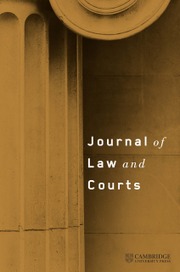Article contents
International Criminal Law and Its Paradoxes
Implications for Institutions and Practice
Published online by Cambridge University Press: 21 October 2022
Abstract
This article challenges international criminal tribunals’ (ICTs) capacity to perform the socially constitutive work of transitional justice. Highlighting paradigmatic ICT jurisprudence, I show that both the “progress” and “justice” constructs central to the work and legitimacy of international criminal law are unrealizable under current ICT practice. This is due to international criminal law’s foundational, legitimizing basis in natural law rather than political liberalism. I call for a revision of ICT institutional accountability structures.
- Type
- Research Article
- Information
- Copyright
- © 2017 by the Law and Courts Organized Section of the American Political Science Association. All rights reserved.
Footnotes
This research is funded by the Danish National Research Foundation grant DNRF105 and conducted under the auspices of iCourts, the Danish National Research Foundation’s Centre of Excellence for International Courts. The author wishes to thank Brooke Harrington, David Klein, and the anonymous reviewers at the Journal of Law and Courts for editorial suggestions.
References
- 1
- Cited by


